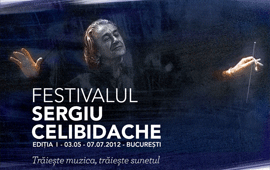> [Archived] Interviews

Interview with Serge Celibadache, the Son of Musician Sergiu Celibidache
The schedule of the festival you are organizing is a busy one. You have master classes, concerts, photo exhibitions, video projections and book signings. Could you please tell us how the schedule came about and who will be invited to take part in this first edition?
This festival is a great opportunity for us. It is important to bring to this festival a part of my father's musical world through the people who have worked with him, to draw attention to the valuable talent that Romania has but, due to various reasons, has been unable to nurture as well as other countries. It is an opportunity for us to create a new tradition. We hope to achieve something wonderful by combining the program we have, the knowledge and the inspiration. For me, knowledge has always been the starting point: that is why I feel it's important for the new generation, who is unfamiliar with Sergiu Celibidache, or for those who might have forgotten him, to be reminded who he was and what he did. For this we will be showing archive documentary footage so as to see him in his element and experimenting with sound, we will be reading books to rediscover the way his mind worked and we will try to portray his life by showing photographs. But the most important thing to do after you have learned about Sergiu Celibidache in these ways, by looking in the past, is to look at the future or at least to be in the present and this is what the master classes are all about. Through them, people who have worked with Celibidache, people who have had certain experiences with him can share them with today's musicians. Of course, the concerts will stand as examples of how music can be made. And for this it was also obvious that we had to bring in musicians who have worked together with my father and who could now exemplify how their collaboration came to life on stage. There will be different directions, but the most important thing is not necessarily how we will remember my father, but how we illustrate the phenomenology of music and the impact of sound on people.
Translated by Vlad Bîrsan and Mihaela Melneciuc
MTTLC, Bucharest University














